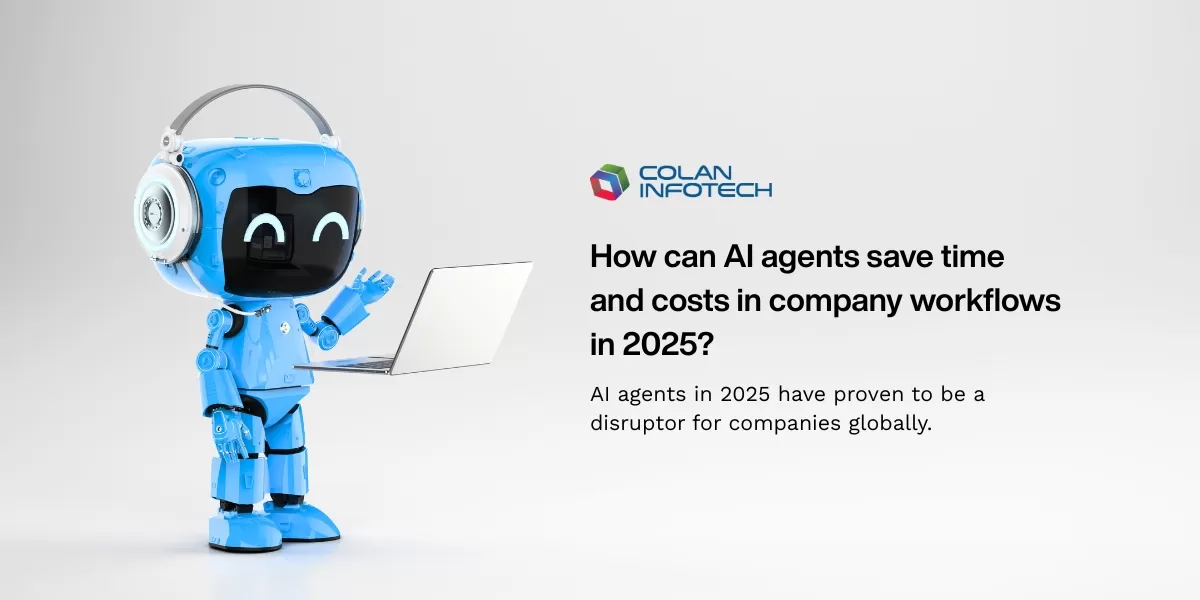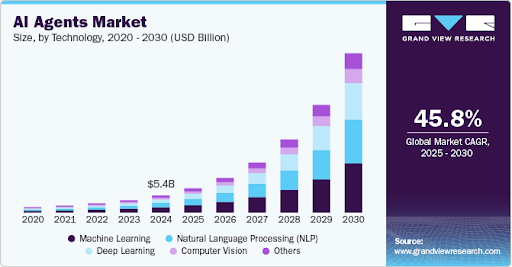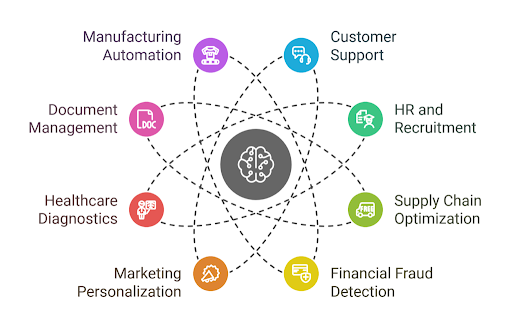 ChatGPT
ChatGPT
 Grok
Grok
 Perplexity AI
Perplexity AI

4 min read | By Admin | 09 June 2025 |
Source: Marketsandmarkets
AI agents in 2025 have proven to be a disruptor for companies globally. These systems are not merely tools anymore but are themselves participating partners who streamline processes, increase efficiency, and keep businesses competitive in fast-paced markets. This blog discusses what AI agents are, the current developments that are defining them, their categories, how they are distinct from agentic AI, and how they are helping businesses.

AI agents are autonomous software systems designed to perform tasks, learn from data, and make decisions with minimal human intervention. AI agents differ from conventional software since they adapt, learn, and interact dynamically with the world around them. They work by sensing input, processing information and subsequently acting to accomplish certain goals.
AI agents’ workflow can be used to repeat tasks, process large amounts of information, suggest recommendations, and even to talk to the customer or employees directly. They are thus very useful for optimizing operations and maximizing efficiency.
The year 2025 marks significant progress in AI agent capabilities, driven by breakthroughs in machine learning, natural language processing, and real-time data processing. Key advancements include:
AI systems now perform advanced multi-step tasks independently without the need for human intervention, adapting strategies as circumstances change.
Natural language processing has been upgraded to enable agents to comprehend and react more human-like and contextually aware.
AI agents are more smoothly integrated into current business platforms and workflows, making adoption easier.
Agents are now capable of collaborating with humans more efficiently, offering insights and completing human capabilities.
Agents can analyze data faster, allowing for real-time actionable insights that enable digital transformation with AI and help business automation respond rapidly to changes in the market.
AI agents exist in different forms each designed to suit unique business requirements.
These react immediately to the inputs with no recollection of previous interactions and rule-based tasks.
These deliberate actions are based on an internal world model, appropriate for the solution of complicated problems.
They get better over time with experience and data, changing in response to new conditions.
They are designed to interact and cooperate with humans or other agents to work together and make joint decisions.
They can move from one system or network to another to perform jobs, with flexibility in distributed environments.
The categories assist companies in choosing an appropriate AI agent for their particular workflow requirements.
| Feature | Agentic Workflows | Traditional Automation |
|---|---|---|
| Structure | Flexible and adaptive sequences driven by AI agents | Fixed rules and predefined steps |
| Decision-making | AI-driven workflows with the ability to learn, reason, and improve | Rule-based, no learning capability |
| Responsiveness | Dynamic; responds to context, goals, and real-time changes | Static; reacts only to known triggers |
| Complexity Handling | Suitable for multi-step, high-complexity decision processes | Best for repetitive, low-complexity tasks |
| Human Involvement | Works autonomously with minimal human input | Requires regular oversight and updates |
| Scalability | Highly scalable and self-adjusting across workflows | Limited; often needs manual adjustment for scaling |
| Examples | AI agents managing sales pipelines, personalized customer journeys | Automated emails, invoice processing |
AI agents are no longer experimental tools but are already being employed by top firms to enhance processes, enhance efficiency and provide improved customer experiences. The following are some real-life examples of how ai business transformation are applying AI agents to trigger change
Leading ecommerce, food delivery, and cab aggregation apps employ AI-based virtual agents to assist customers 24/7. These agents can answer common questions, track orders, and even assist with troubleshooting, reducing wait times and easing the load on human support teams.
Salesforce’s Einstein is a perfect example. It examines previous customer history, forecasts which leads are likely to convert, and suggests next actions to sales reps. This kind of AI agent allows businesses to close deals faster and focus on higher-value leads.
Companies like Amazon, Netflix, and Spotify utilize AI agents to personalize customer experiences. The agents look at watching or buying habits and suggest content or products that are relevant to users, maximizing interaction and sales.
Also, popular banks and fintech companies use AI agents to detect unusual transactions, flag potential fraud, and provide customers with spending insights or saving recommendations.
AI agents in healthcare are being used to assist patients with symptom checking, appointment scheduling, and health tracking. These devices take pressure off clinics and provide instant access to health-related guidance.
In the logistics sector as well, top players apply AI agents to monitor packages, forecast delays, and determine routes to deliver packages in real-time. It makes deliveries quicker and customers satisfaction.

AI agents are going to transform business process automation from basic tasks to smart, independent, and proactive operations. They will coordinate sophisticated procedures between departments, really enhancing efficiency by curtailing manual labor, minimizing errors, and decision-making by means of data analysis.These agents will also transform customer and employee experiences by offering personalized service and augmenting human capabilities, freeing up teams for higher-value work.
AI agents are revolutionizing business workflows in 2025 by automating sophisticated activities, strengthening decision-making and creating improved human-machine collaboration. Their growing capabilities make them a must-have for organizations that want to enhance efficiency, customer experience, and flexibility. As AI agents keep evolving, businesses that adopt such technologies in the early stages will best be equipped to thrive in the future of work.
AI agents are more adaptive and intelligent than RPA, capable of learning and making decisions, while RPA remains rule-based and limited to repetitive tasks.
Yes, AI agents can personalize the workflow across departments through scan real time behaviour and data.
Healthcare, finance, e-commerce, logistics, and customer service are the industries can get the most benefits from AI-based workflow automation.
Yes, artificial intelligence agents are leading the next digital transformation by making intelligent, autonomous and scalable operations possible.
The most popular AI agents are Salesforce Einstein, Microsoft Copilot, IBM Watson, and open-source tools coupled with LangChain or AutoGPT.
AI will increase productivity by automating sophisticated tasks, limiting manual labor, and enabling employees to concentrate on strategy, creativity and innovation.
Join over 150,000+ subscribers who get our best digital insights, strategies and tips delivered straight to their inbox.